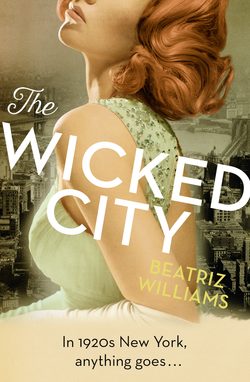Читать книгу The Wicked City - Beatriz Williams, Beatriz Williams - Страница 10
3
ОглавлениеUNLIKE BILLY—THAT tall, slender sapling, full of promise—the stranger at the bar is a live oak. Limbs thick, neck like a trunk. Ears planted on each side of his head. His shorn golden-brown hair puts me in mind of a pelt. Next to his elbow, atop the plain black overcoat, his hat contains the perfect curves of a Fifth Avenue haberdashery, the kind that charges you a mint and sends you out a gentleman. Next to his other elbow sits a glass of sweet milk, straight up.
“Evening, Gin.” Christopher nods to the stranger. “Fellow was asking for you.”
I point to the milk. “Make it two, will you?”
Christopher turns away, and I hold out my hand. “Ginger Kelly. I couldn’t help admiring your shoulders. Do you swing from trees?”
“Not since I was ten.” (Voice like a bass drum, beaten by a knotted rope.)
“Crush coconuts between your bare palms?”
“That depends on what you mean by coconuts.” He takes my hand. “Oliver Anson.”
“What a civilized-sounding name. Irish?”
“English.”
“My mistake.”
The milk lands on the counter. Christopher adds a look that asks whether I require any assistance, and I return a look that says, Keep an eye on Billy for me, will you? I lift my glass. “Cheers.”
“Cheers.”
Clink.
Drink.
The band starts a new piece, drawling, full of blues. Bruno’s bass thrums up and down. The milk is ice-cold and creamy and pure on the tongue, the taste of childhood, and as I study Anson’s face over the rim of the glass, I consider the contrast between his genteel clothes and his rocky, tanned face. His eyes, so dark a blue they are almost without color at all. I can usually take down the measure of a man at first glance—it’s a talent of mine, the way some folks can whip up a soufflé or paint someone’s face—but this one isn’t adding up. A cop doesn’t have the dough to dress like that. A gangster doesn’t have the taste. Anyway, he’s young. Not as young as Billy, but younger than I thought. The few lines on his face are new and kind of faint, as if sketched by a needle. I set down the milk.
“Tell me something, Mr. Anson. Just how did you come to know my name and whereabouts?”
“Does it matter?”
“It might. A girl making her way in the big city can’t be too careful.”
“I quite agree.”
“And you can’t trust a living soul, I’ve found. Always some do-gooder skulking around, you know, the vice patrol, looking to catch a girl out on the town for the crime of having a good time.”
“You think I’m some kind of bull?”
“Now, what kind of question is that? We’re just standing here, drinking our milk like good little boys and girls. Nothing wrong with that.”
He glances at Billy and back again. “Is he yours?”
“Maybe he is and maybe he isn’t. I don’t believe that’s any of your business.”
“I think he’s about to make it my business.”
So Billy storms up, flushed to the temples, neck pink against his white collar, and inserts himself between me and Anson. Demands to know what the devil he thinks he’s doing. They’re the exact same height, maybe six feet and a hair of the dog, but I believe Billy weighs about half as much. Anson replies to this perfectly legitimate question with the polite tolerance you might lay on a stale doughnut. Says something about having a private word with me.
“Well, you can’t have a private word with her.”
“Can’t I?”
“No. Miss Kelly has nothing to do with you, nothing at all. She’s here with me, do you understand? Minding our own business.”
“I see.” Mr. Anson finishes his milk, lays a dollar bill on the counter. Collects his hat and his overcoat. Nods to me in such a way that you could almost call it a bow. “A pleasure, Miss Kelly.”
“All mine, Mr. Anson.”
He walks away, leaving that whole dollar bill unchanged on the counter, straight up the steps and out the door, and Billy turns to me, all bright and crackly with triumph, the dear young thing.
“Well! I sure as hell showed him, didn’t I?”
